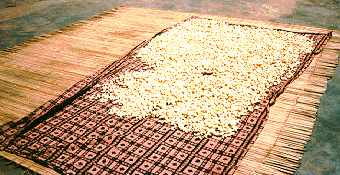

ORGANIC PAGE
At the cashew processing center in Quinhamel, raw cashew nuts are boiled in a large cauldron for 25 minutes, then sun-dried for 48 hours, causing the nut to separate slightly from the shell for easier processing. Processors then remove the shell, cashew by cashew, with a foot-powered shelling machine.
The kernels are spread on special cooking screens and dried for seven hours at 170º. Along a series of tables, workers remove a thin skin which covers the kernel, then separate the cleaned, dried nuts into wholes, halves and broken pieces by size and quality grades. Even the tiniest bits are gathered as a "flour" for use in pastries and confections. Once separated and grouped in accordance with international standards, the cashews are roasted and packed for shipping.

Because cashew trees flourish in Guinea-Bissau's soil, production is entirely organic and environmentally sound, requiring no pesticides or fertilizers. Processing is likewise environmentally friendly and efficient. All parts of the cashew are used in the process: the discarded shell is burned to heat the cauldron where the raw nuts boiled, the skins can likewise be burned or mixed with grains for livestock feed, and the ovens can be fired with pruned branches from a well-maintained orchard.
Home-based cashew processing has very low energy requirement -- only fuel for cooking and drying. Workers shell and clean cashews using available light in group settings conducive to social interaction. The cashew processing machines are hand- and foot-operated. These machines, originally imported from Brazil, are now manufactured locally. Thus cashew processing is an environmentally sound activity which can be carried out by Guineans, without the need for foreign assistance. Sale of processed nuts provides year-round opportunities for employment and sales -- unlike the sale of raw nuts for processing abroad, which covers only a few months each year.
Produced by Steele Communications